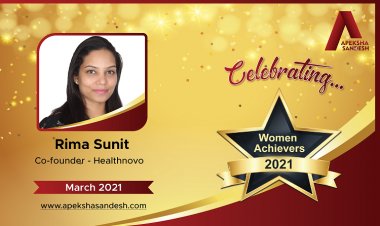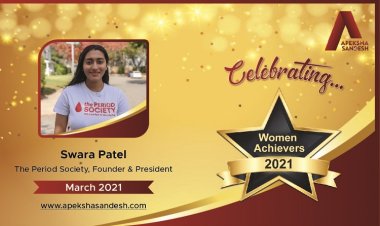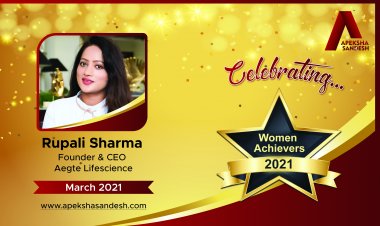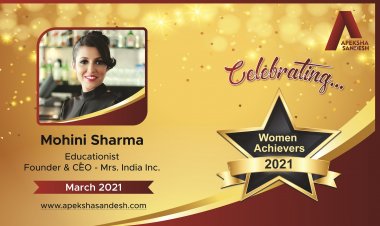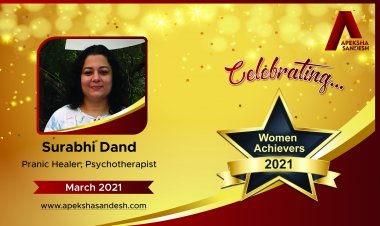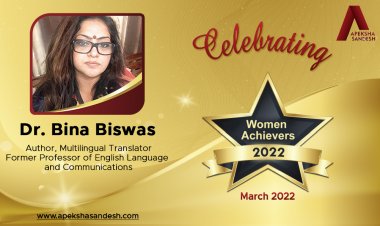It is not only the responsibility of the government to clean the environment, but the role and involvement of citizens is crucial: Dr. Pratima Singh, Research Scientist at Center for Study of Science, Technology and Policy (CSTEP)
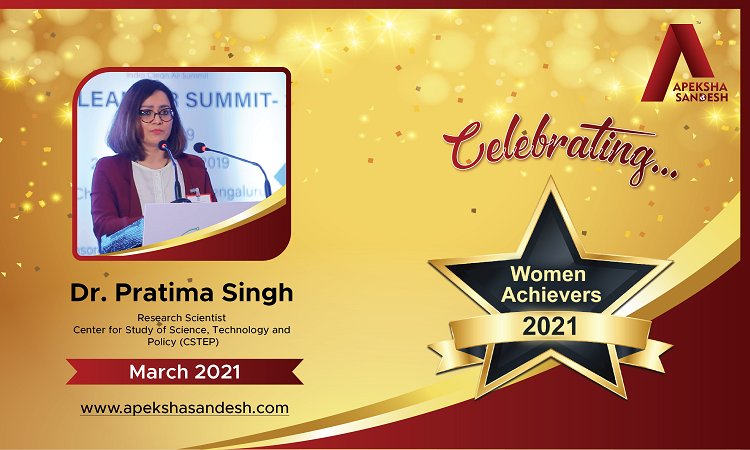
Dr. Pratima Singh is a Research Scientist at the Center for Study of Science, Technology and Policy (CSTEP). She heads the Center for Air Pollution Studies (CAPS) at CSTEP and is building capacity in monitoring and measurements; modeling studies; and policy analysis and outreach. She has contributed to various studies such as mobile monitoring, preparing emissions inventory, source apportionment studies, and modeling. Currently, along with her team, Dr. Pratima is working at the national level (in 88 cities across the country) to develop knowledge and understanding of air pollution issues. Her research interests lie in carrying out policy scenario analysis of the business as usual (BAU) measures and analysing future scenarios.
Dr. Pratima holds a Ph.D. in Energy and Environment and her doctoral research was on ‘Energy use and GHG emission analysis of urban wastewater infrastructure and scoping for use of renewable energy resources’. Her work focused on different forms of energy consumption and GHG emissions estimation for urban wastewater infrastructure.
Prior to joining the Doctoral programme, Pratima worked as a Resource Scientist with Compusense Automation, in Ahmedabad and as Project Manager with Gujarat Council of Science and Technology (GUJCOST) – DST, Government of Gujarat. She handled the responsibilities of Programme Associate for an e-learning programme called ProSPER.Net (UNU-IAS). She has also worked as a Project Associate for Asia Pacific Network (APN) funded Water-Energy-Carbon nexus project at TERI University.
Dr. Pratima Pratima has been a recipient of the Senior Research Fellowship from the Ministry of New and Renewable Energy (MNRE) for her Doctoral research and honorary Senior Research Fellow at the University of Birmingham, U.K.
In her current position, she engages with policymakers and regulators to help them with knowledge and information on the ill effects of air pollution. She is also instrumental in creating awareness among the citizen groups through media articles, workshops, and various discussions. She aims to contribute towards making India clean and improve the quality of life for the citizens.
Apart from this, Dr. Singh regularly participates in 5km and 10 km marathons.
Apeksha Sandesh had an opportunity to interact with Dr. Pratima Singh, a motivation to many women, who despite disabilities have been only moving forward, and conquering all the issues that life gives you, like a true warrior! Here she talks about her role with policymakers and regulators to help them with knowledge and information on the ill effects of air pollution, shares some insights on controlling air pollution, and much more. Check out the excerpts!
Can you tell us about how you began your career and your role at CSTEP?
Post my graduation in Chemistry, I was inclined towards environmental concerns. I pursued a Master’s in Geo-Technology that helped me to understand the problems in a better way. In the last semester of my master’s program, I was selected for an internship at the Indian Space Research Organisation (ISRO), Ahmedabad. That was my dream internship where I wanted to use satellite images to analyse environmental challenges on the ground and look for solutions. Unfortunately, I missed out on that golden opportunity due to a life-changing event – met with an accident. Post my recovery, I worked towards pursuing my goals to work in the environment sector. I joined Bhaskaracharya Institute for Space Applications and Geoinformatics (BISAG), Gandhinagar to complete my master’s internship. I was the gold medalist of my batch.
All this hard work had made me nothing but more determined to follow my dream of getting a Ph.D. degree. My peers motivated me at every stage and immense support from my parents helped me to follow the path that I had envisioned. I completed my Ph.D. from TERI University in Energy and Environment subject. After my Ph.D., I secured the position of Research Scientist at CSTEP and was assigned the task to work in the domain of air pollution. I took up the challenging work, build my team, and carried out quality work in various states. I feel proud to say that CSTEP gave me a platform to showcase my leadership qualities, as well as a researcher. Currently, I lead the Center for Air Pollution Studies at CSTEP and we are conducting studies to empower the policymakers and citizens towards creating awareness towards the impact of air pollution by generating scientific evidence and carrying out policy analysis.
Research is a niche mainly dominated by males. Tell us about your journey so far in creating a space for yourself and achieving success. What kind of challenges have you faced being a woman in the process, if any?
I would disagree with the fact that research is dominated by males. To my surprise when I started my Ph.D. program at TERI University, 70% of the students were women who wanted to work in the environment sector and contribute to society. Yes, this might be right when it comes to conventional subjects like Physics, Mechanics or non-conventional subjects like Artificial Intelligence or coding. But for sure, the situation in the country is changing. Women are becoming more proactive towards working in all the domains and achieve success.
Frankly speaking, my journey so far has been incredible. With God’s grace, I have never been rejected on any front being a woman. My hard work and perseverance have helped to carve a place in my work domain. Moreover, peers have always been supportive and guiding towards me setting a benchmark for excellence in my life.
The government of India is promoting environmental research and education through some initiatives. How far have they been successful? Do you have any suggestions to the government that you feel will make a difference?
The Government has been definitely promoting education and literacy for girls through various initiatives and programs in the country. The government is also providing support to women in the environment sector by providing many fellowships. I too had begged a fellowship from the Ministry of New and Renewable Energy (MNRE) for carrying out my research. Many women have benefited from such initiatives from the Government. However, not many people are aware of such programs until they are well-connected. Hence, I feel more awareness needs to be created of such initiatives in various schools, colleges, and research institutions so that women can come forward and pursue their dreams.
Your role allows you to engage with policymakers and regulators to help them with knowledge and information on the ill-effects of air pollution. What is the core issue of the problem that still exists?
India as a country is facing a huge challenge towards bad air quality. This is mainly due to contributions from few sectors such as lack of public transportation, unpaved roads, unregulated industries, use of solid fuel for cooking in the rural areas, solid waste burning, and other few sources. Our geographical landscape and citizen’s behavior are also the culprit for the deteriorating air pollution levels in the country.
Some policies exist in the country towards solving the challenge, but as I always say, there is no magic wand that the problem can be eradicated soon. Moreover, it is not only the responsibility of the government to clean the environment, but the role and involvement of citizens is crucial. Till the point, we don’t change our behavior towards burning dry waste; littering on roads; usage of private transportation, and fossil fuels, we are not going to achieve the desired targets. The government is providing incentives and rebates, and we should wisely use them.
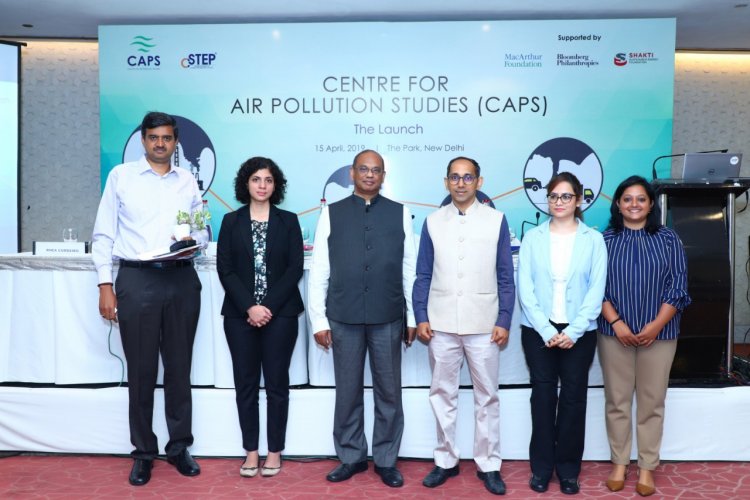
India is still known to be a ‘developing country’. Meanwhile, pollution is claimed to be the result of this development. In your opinion, how can we strike a balance to attain a win-win situation?
Rightly said that India is a developing country and air pollution is a byproduct of that development. But the development cannot take place at the cost of degrading the environment. It is essential to understand that to empower the citizens we need to have employment and livelihood. And for that, we need industries and other sectors to grow. However, by using the right technology and control devices, we will be able to achieve the desired results.
There needs to be a nexus among the state departments and political wings at the state level as well as the center to frame and revise policies towards the usage of new and clean fuel. We need to focus on developing infrastructure to support the policies too!
To achieve a win-win situation, we (government departments, health sector, citizen groups, research institutions, and academicians) all need to work collectively. Having said that, what is even more important is to communicate the solutions to the citizens for them to adopt and implement.
While we are still getting used to ‘renewable energy resources’, how far have we been successful as a developing country in taking benefit of such resources.
I would say definitely we have grown in the direction to build our capacity to generate and use renewable sources of energy – be it solar, wind or waste. We have seen a decrease in the solar energy generation cost in the last couple of years. This is a positive sign indicating progress.
A simple example of solar lanterns being used in the rural areas of the north or generating energy from the sludge of wastewater indicates India is using renewable sources of energy.
You have been instrumental in creating awareness among the citizen groups in making India clean and improving the quality of life for the citizens. What kind of activities are involved in this? How is the response from the citizens usually?
I have been working towards building the capacity of not only the policymakers but also the citizen groups. On a larger scale, citizens do not have an understanding of what particulate matter - PM2.5 means or what the Air Quality Index (AQI) stands for. Until and unless we understand the language of the problem, we won’t be able to solve it.
During my interaction with citizen groups, I have realized that it is all because of the lack of appropriate funds and resource availability which has prompted the social and behavioral pattern of our citizens. We need to understand the core issue and then communicate the solutions. If citizens don’t have resources, they will fall back on what is easily available, e.g. using firewood/cow dung for cooking, using coal in roadside eateries, using coal and furnace oil in industries, etc. The impact of using dirty solutions needs to be communicated. Impact on human health faced by women and children, respiratory illness among the male workers, and many more need to be communicated effectively. Once they are briefed that PM2.5 levels higher than 60 µg/m3 is harmful to them, they understand the problem.
Please share some tips for using ‘renewable energy resources’ in our day-to-day life?
Citizens can install solar rooftop panels to generate electricity. It will be challenging as that will require capital and operation costs, however, the payback period to recover the cost is low. Moreover, citizens can follow the 3R’s of the environment – Reduce, Reuse and Recycle their waste in various forms, which will definitely be huge support towards the environment.
While in college, you faced a major accident that turned your life upside down. What exactly had happened and what were its repercussions?
Nobody is prepared for any challenges or turning events in their respective lives and so wasn’t I. I was excited to join ISRO and just 3 days before joining the institute I met with a train accident. I didn’t anticipate the severity of the accident when it happened. At that stage, my only concern was to reach the hospital and let the doctors do the work. Moreover, I was kept aloof from the crucial information that I would lose my legs for almost 10 days while I was in the hospital - all credit goes to doctors, my parents, and friends who managed to hide it from me by rolling bed-sheets as my legs and made me believe that my legs are intact. Doctors and people around me were scared that I might not be able to cope with the tragedy and might need psychiatric help. However, one fine day my mother was washing my hair and I wasn’t able to feel my legs and I asked her to tell me the truth – to which she responded, “the accident took away your legs”. I just stayed calm as my mother cried her heart out. It was the same situation when I had met with an accident. At that point I told my mother that legs meant for walking, I can walk using artificial limbs.
My perspective towards life was positive since childhood and I had patience. Probably that perspective acted as a sponge which helped me to absorb everything and move ahead in life. I embraced my life without reservations, regret, or remorse. Thought it was a roller coaster ride with a lot of challenges – from learning to walk again, to carry out daily chores, to climb the stairs and you name it. I just took life as it came and bloomed. Today, I am proud that I can perform any activities that a so-called normal person can do from dancing to running to climbing the hill. It has been a beautiful life.
I would change nothing as this accident has shown me what I am, what I am capable of, what my strengths are, and how much more I can take in life. This accident has just enhanced the personality and made me more who I wanted to be – a person who has a fighter spirit and doesn’t take no for an answer. I have always believed in ‘I M Possible than IMPOSSIBLE’.
Society might think of people like me as DISABLED but believe me, I am a part of a group with 1100 differently able people who are more than abled and live life to the fullest.
You are a motivation to many women, who despite disabilities have been only moving forward, and conquering all the issues that life gives you, like a true warrior. What makes you keep going? On the days when things don’t seem right, how do you pull back?
I am honored if you say so, but I believe that I have a long way to go. I still have to achieve a lot in life and make my parents proud of being their daughter. Post my accident, I remember my parents secluded themselves from society as everyone would tell them that it is such an ill-fate, she won’t be able to walk and be normal again. Constantly hammering the same stuff in their head, my parents cut all ties around them. I wasn’t aware of all this as I was away studying. My parents and my brother stood like a rock with me, which was more than enough for me to excel in my life.
I did have bad days when I used to get blisters on my stump or the skin would crack and bleed but eventually, I realized that now it is the part of my life and it is OK. On such days I just have to forget about the pain and keep moving as life won’t stop for me to relax. My friends have been a great source of support and strength, who have always adored me which keeps me smiling. On the way till here, I have made beautiful relations which are like an energy booster for me. I have seen death quite close, and hence know that every moment is beautiful, and we should just live it.
What is the biggest struggle of a woman today in India?
We still live in a patriarchal society where women are subjected to numerous challenges. Multitasking and managing multiple jobs is just part of her life and that isn’t enough to prove her worth on all fronts. Things are definitely progressing, but we need to ensure somehow that women in the country are safe. It saddens me to see that even education hasn’t helped women to protect themselves. I can’t prioritize at this stage what is the biggest struggle for women.

What main change would you like to see for young girls in the next generation?
I would want young girls to focus on education as that will help them gain confidence, stand on their own, and excel in life. Education could be in any sector that they are interested in – be it sports, science, arts, commerce, community work, or anything. This will also help them to have their independence through progress.
Are there any assumptions about women that you would like to change? Why?
Every single woman is STRONG and BEAUTIFUL in any form. People need to stop objectifying women and treat them with dignity.
International Women’s Day celebrates the scientific, political, economic, and social achievements of women. In your experience as a successful woman, what is its significance?
In the very first place, we need to understand what is the need to celebrate International Women’s Day? Because women were discriminated against. To eliminate the injustice, we had to celebrate women and empower them. We celebrate her achievements in all sectors and bridge the gender gap. I am sure this has helped women showcase their capabilities on various platforms and achieve respect among peers. This has definitely helped women gain confidence and secure position as EQUALS among the masses.
Apeksha Sandesh congratulates Dr. Pratima Singh for her contribution and commitment towards the field of science and research with her works, and wishes her all the best for her future endeavours!




